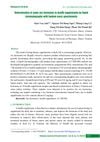 1 citations,
March 2012 in “Journal of Dermatological Science”
1 citations,
March 2012 in “Journal of Dermatological Science” Testosterone, progesterone, and levonorgestrel change enzyme levels related to fat production in hamster skin, which could affect skin oil and acne.
[object Object]  1 citations,
April 2010 in “Expert Review of Dermatology”
1 citations,
April 2010 in “Expert Review of Dermatology” The document concludes that early diagnosis and treatment are crucial for managing rare hair loss disorders and that more research is needed to improve treatment strategies.
 1 citations,
April 2009 in “Expert Review of Dermatology”
1 citations,
April 2009 in “Expert Review of Dermatology” The new gel combining calcipotriene and betamethasone is effective and safe for treating scalp psoriasis.
 1 citations,
February 2004
1 citations,
February 2004 Skin diseases are common and can significantly affect people's lives; better outcome measures and ethical clinical trials are needed to improve dermatology care.
 1 citations,
July 1996 in “Clinical and Experimental Dermatology”
1 citations,
July 1996 in “Clinical and Experimental Dermatology” Routine thyroid tests for diffuse alopecia in women may not be necessary, but checking for iron deficiency anemia could be useful.
 1 citations,
January 1967 in “The BMJ”
1 citations,
January 1967 in “The BMJ” The document concludes that while some hair and scalp disorders can be treated, hair loss from destroyed follicles is permanent, and damaged hair can only regrow naturally.
 July 2024 in “International Journal of Medical Arts”
July 2024 in “International Journal of Medical Arts” Latanoprost is more effective than minoxidil for treating alopecia areata.
 April 2024 in “Medical & clinical research”
April 2024 in “Medical & clinical research” More research is needed to find the best long-term treatments for Alopecia Areata.
 March 2024 in “Biomedical reports”
March 2024 in “Biomedical reports” Isoflavone may help manage PCOS symptoms, but its effectiveness is uncertain.
 February 2024 in “International journal of biology, pharmacy and allied sciences”
February 2024 in “International journal of biology, pharmacy and allied sciences” Plant-based treatments can effectively and safely treat hair loss.
 February 2024 in “International neuropsychiatric disease journal”
February 2024 in “International neuropsychiatric disease journal” Alopecia areata severely impacts quality of life, mental health, and work productivity.
 February 2024 in “Sohag Medical Journal”
February 2024 in “Sohag Medical Journal” Various local treatments for alopecia areata show promise, but individualized plans and more research are needed.
 February 2024 in “PloS one”
February 2024 in “PloS one” Tofacitinib and adalimumab are promising treatments for cicatricial alopecia with few side effects.
 January 2024 in “Archives of dermatological research”
January 2024 in “Archives of dermatological research” Both treatments for alopecia areata showed similar modest effectiveness.
 December 2023 in “Research in pharmacy”
December 2023 in “Research in pharmacy” Phytotherapeutic compounds and supplements can help manage Polycystic Ovarian Syndrome (PCOS).
 December 2023 in “Kiểm nghiệm và An toàn thực phẩm/Kiểm nghiệm và An toàn thực phẩm (online)”
December 2023 in “Kiểm nghiệm và An toàn thực phẩm/Kiểm nghiệm và An toàn thực phẩm (online)” The method detected sex hormones in some health supplements, with one containing banned testosterone.
[object Object]  October 2023 in “Benha Journal of Applied Sciences”
October 2023 in “Benha Journal of Applied Sciences” Methotrexate and vitamin D3 are potentially more effective and safer than triamcinolone for treating localized alopecia areata.
 September 2023 in “Research Square (Research Square)”
September 2023 in “Research Square (Research Square)” Evening primrose oil significantly improves hormone levels and reduces BMI and cholesterol in women with PCOS.
 August 2023 in “Vittalle”
August 2023 in “Vittalle” Mais estudos são necessários para garantir a eficácia e qualidade dos tratamentos de alopecia com plantas medicinais.
 July 2023 in “The Egyptian Journal of Hospital Medicine ”
July 2023 in “The Egyptian Journal of Hospital Medicine ” The conclusion is that emotional support and a variety of treatments are important for alopecia areata, but more research is needed.

Female rats showed more panic-related behavior than males, influenced by hormonal cycles and certain drugs.
 June 2023 in “Dermatology and therapy”
June 2023 in “Dermatology and therapy” The Middle East and Africa need better data, treatment consensus, and support for Alopecia Areata.

Both treatments for localized alopecia areata are equally effective.

Baricitinib is a new, effective treatment for advanced alopecia areata but is costly and has risks.
 January 2023 in “Archives of Disease in Childhood Education & Practice”
January 2023 in “Archives of Disease in Childhood Education & Practice” Hirsutism in teens is often due to polycystic ovarian syndrome and needs careful assessment and support.
 July 2022 in “SKIN The Journal of Cutaneous Medicine”
July 2022 in “SKIN The Journal of Cutaneous Medicine” A new lotion with halobetasol and tazarotene successfully treats acne keloidalis nuchae.
 July 2021 in “International journal of dermatology, venereology and leprosy sciences”
July 2021 in “International journal of dermatology, venereology and leprosy sciences” Diphenylcyclopropenone is more effective and has fewer side effects than dinitrochlorobenzene for treating alopecia areata.
 March 2021 in “Clin-Alert”
March 2021 in “Clin-Alert” The FDA warned about safety issues with remdesivir and tofacitinib, finasteride is linked to suicidality, potent topical corticosteroids increase osteoporosis risk, henna can cause hemolysis in G6PD deficiency, chemotherapeutic agents can cause adverse reactions, drug interactions are common in cancer patients, ketamine can reduce at-risk drinking, high dose of anticholinergics increases dementia risk in Parkinson's patients, and prenatal exposure to second-generation antipsychotics increases pregnancy complications.
 February 2021 in “Journal of pharmaceutical and biological sciences”
February 2021 in “Journal of pharmaceutical and biological sciences” No cure exists for alopecia areata, and treatments are personalized.
 November 2020 in “Elsevier eBooks”
November 2020 in “Elsevier eBooks” Antiandrogens and androgen inhibitors like spironolactone, finasteride, and dutasteride can treat hair loss and skin conditions, but they have risks and side effects, including potential harm to pregnant women and risks of cancer and heart issues. Herbal remedies also have antiandrogenic effects but lack safety validation.






























